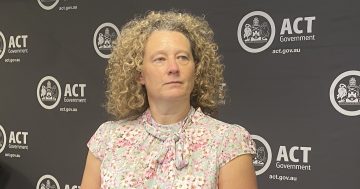
ACT Chief Health Officer Dr Kerryn Coleman. Photo: Michelle Kroll.
Why should the people of Canberra, regularly touted as the most educated and sophisticated in the land, be denied information about what has been until recently a singular issue for the nation over the past couple of years?
The Freedom of Information release of email documents this week confirms what many in the media have suspected, that despite enormous goodwill during the COVID-19 public health emergency, ACT Health was keeping people in the dark about vaccine status, comorbidities and deaths in palliative care, especially during the Omicron wave.
ACT Health has not only withheld information made available in other jurisdictions but obfuscated about why, saying at first that it did not routinely collect the data.
But emails reveal that ACT Health did not want to provide the information as a matter of course because it didn’t trust Canberrans to understand the data, didn’t want people to get the wrong impression or draw simple conclusions about what were complex situations.
Even Health Minister Rachel Stephen-Smith admitted there were “robust conversations” – the usual euphemism for an internal brawl – between her office and ACT Health about releasing some information to the public.
Despite an acknowledgement that the information was important to the whole picture of the pandemic in the ACT, ACT Health, including Chief Health Office Dr Kerryn Coleman, regularly fudged answers to media questions or reeled off excuses.
Under fire from the Opposition, which has had to take stick during the pandemic for being too critical and undermining the trust Canberrans should have in the health authorities, Ms Stephen-Smith retreated to the last redoubt – the ACT’s absurdly strict privacy laws that regularly stymie journalists trying to do their job and keep basic information out of the public arena.
Despite the information being ‘deidentified’, Canberra’s small population means people might be able to work out who was in ICU or who had died, she says, as if that’s what busy people do around the water cooler or kitchen table.
Those already close to the situation would know anyway.
The context needs to be remembered: a Territory where public health orders restricted gatherings, travel, compelled mask-wearing and check-ins, and mandated vaccination for some, amid campaigns for double-dose vaccination and then booster shots for protection.
The vaccination status of victims, information that media had to request, is an essential part of this overall picture, as is the age and setting where people are falling ill and dying.
But it seems that information that might cause people to question the public health measures was considered too sensitive to release.
When a government needs to restrict liberty to maintain public health, the trade-off should be that its citizenry is kept informed.
It is not for bureaucrats and politicians to enlist that trust and then treat citizens as children or to fret about potential blowback and having to be accountable for their decisions.
They should not hide behind privacy rules, and public servants should not fear they are breaking the law to provide information the public wants and should know.
The Barr Government talks about transparency, but this episode reveals a health bureaucracy that does not trust its own minister or the people of Canberra it serves.
It shows that at the Health Directorate, for all the controversies and reviews of recent times, the reform work is not done yet.
A review of the ACT’s privacy legislation should also ensure it is not a screen for secretive governments or public servants.





















